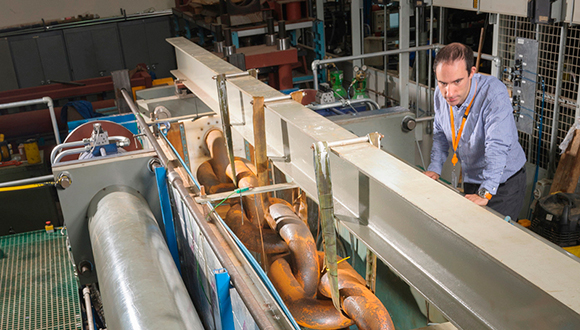Sun, 08 July, 2018
Dr Imanol Martinez Perez became interested in engineering when he was in high school, having considered mechanical engineering as a mixture of maths and physics but keeping in mind a practical perspective.
After studying mechanical engineering at the University of the Basque Country (Bilbao, Spain), Imanol enrolled in a double degree program with Arts et Metiers ParisTech (Paris, France). From there he secured a six months internship at Subsea7 (Suresnes, France) in the structures department, before graduating as a Mechanical Engineer.
Imanol continued to work at Subsea7 for nine months in the assets team, where his roles included performing structural calculations of installation aids, platform maintenances, sea fastening of large structures for the different vessels of Subsea7’s fleet, amongst others.
In 2015 he embarked on his PhD with NSIRC and the University of Edinburgh, working in the Numerical Modelling and Optimisation Section at TWI. His research was on the computational fatigue assessment of mooring chains, taking into account residual stresses.
 Imanol Martinez Perez during his PhD research project at NSIRC. Photo: TWI Ltd
Imanol Martinez Perez during his PhD research project at NSIRC. Photo: TWI Ltd
Within the oil and gas industry, there was concern over the increase in mooring line failures and, despite the remarkable progress in this area, there is still no robust fatigue assessment method that accounts for the combined effect of residual stresses and mean load. A significant number of Joint Industry Projects (JIPs) have been launched for better understanding and improving fatigue analysis of mooring chains.
At NSIRC, Imanol’s work highlighted the need to take mean load into account, and he developed a method to do this through a computational assessment for routine use in an industrial environment. Importantly, the assessment method does not lose accuracy with respect to the original computational fatigue assessment methods. The fatigue predictions showed good agreement with fatigue testing carried out as part of a JIP at TWI.
For the NSIRC Annual Conference in 2018, Imanol submitted his research for the Industrial Impact Award and won first prize. The award recognises students’ research that makes a significant contribution or takes an innovative approach to solve an industrial problem.
"I felt I was standing on the shoulders of giants"
Imanol Martinez
Alongside the Industrial Impact Award, Imanol was awarded a scholarship by ASME for presenting his research to the International Conference on Ocean, Offshore and Arctic Engineering (OMAE) 2018 Conference. During this conference, Imanol presented part of the research he did at Ecole Polytechnique (Palaiseau, France) as a visiting PhD research student at the Laboratory of Solid Materials (LMS).
Imanol regards his time studying for a PhD with NSIRC as “a great experience. It has enabled me to gain scientific knowledge, but at the same time stay connected to industry. I had regular meetings with my industrial mentor, who set me research guidelines based on the challenges faced by industry. I would like to thank my supervisors and my industrial mentors – I felt I was standing on the shoulders of giants”.
Having completed his PhD, Imanol worked at Principia in France, an engineering company developing added-value offer to the energy and naval defence sectors, and is now a Mechanical Engineer at Framtome, a designer and supplier of nuclear steam supply systems and nuclear equipment, services and fuel for high levels of safety and performance. His career path shows how the links between academia and industry at NSIRC equip individuals with the skills and knowledge required of the next generation of engineers in industry.
-
Other News articles from NSIRC